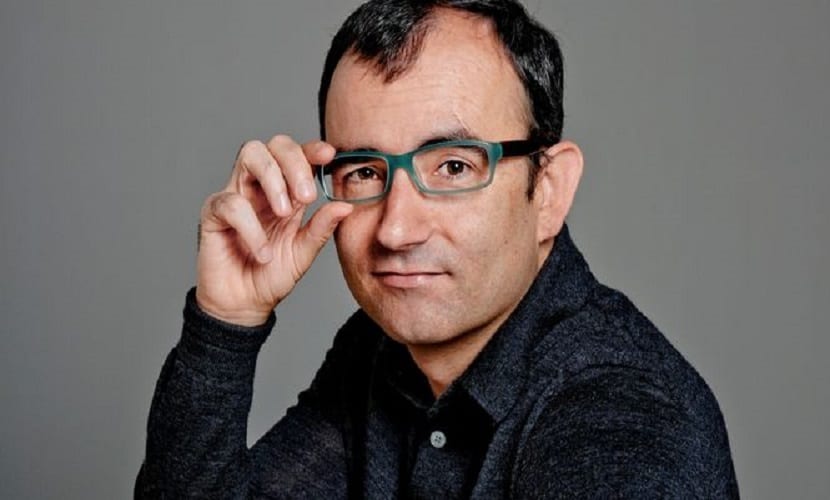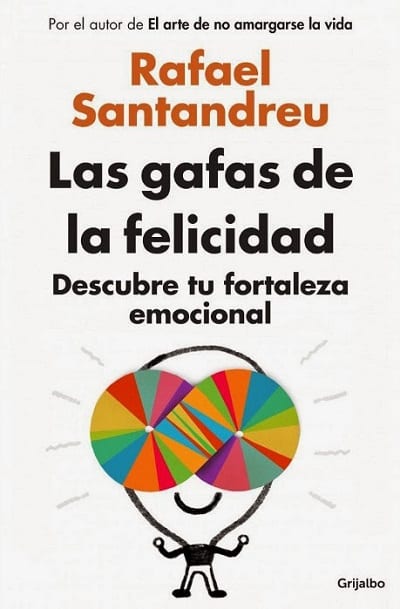
Today we bring you the interview with Rafael Santandreu, psychologist and author of "The glasses of happiness" y "The art of not embittering life". The latter was a great sales success last year in Spain in the category of «non-fiction» and we think that with "The glasses of happiness" a bit of the same thing will happen. We leave you with his words.
AL: First of all, we would like to thank you for giving us a bit of your time to carry out this interview, Rafael. He is one of the best known psychologists in Spain today, and not only for his therapies but also for the success of his book last year "The art of not embittering life", one of the best sellers if not the most in the category of "non-fiction" in Spain. Why do you think your publication has been so successful?
RS: My first book has been very successful because it is really effective. I don't like self-help books because I consider them "collections of pretty words," but not very useful. The type of psychology that I do is called "cognitive therapy" and it is supported by more than two thousand studies published in scientific journals. Many of my readers have bought not just a copy of The Art of NOT Making Your Life Bitter, but 10. Seeing the change that occurs in them, they give them to family and friends.
AL: And he decided not to stop at this writing and a few months ago he released his second book to the publishing market, which he called "The glasses of happiness. Discover your emotional strength ". I personally have not had the opportunity to read it yet. Would you give me a brief summary of what I can find in the book?
RS: You will find the keys to change your character: to become emotionally strong as is, for example, Stephen Hawking, the scientist in a wheelchair. If you radically change your internal dialogue, your emotions change. You will have to practice, do an average of an hour of homework a day, but the prize is freedom and fulfillment.

AL: Do you think Rafael that people are not capable of seeing happiness in small details and hence the title of the book?
RS: Seeing the beauty in little things is a consequence of good mental health. When we are bad we do not appreciate the wonders of the day to day. But the key to that mental health is to combat the "hyper-demands": tell yourself: "I must do everything well or very well or I am a bloody worm of the worst kind!". If you stop giving yourself mental lashes, you begin to breathe easy and calm down… That is where the healing begins.
AL: I have to confess that I follow him on the show For All 2, presented by Marta Càceres and Juanjo Pardo, and listening to him once I thought, if I had the opportunity to speak with Rafael Santandreu one day (wish granted, thank you Genie!) I would ask him what he thinks about the 7 basic needs described by Maslow, since you believe that human beings "need" more than the basics. What do you have to tell me about this?
RS: The Pyramid of Abraham Maslow, a prominent psychologist of the 50s, says that human beings move up from “needs” as they cover the basics. For example, after food and drink, they begin to crave entertainment. Afterwards, a fun job. Then, authentic love ... I would emphasize that it is not about "needs" but about "desires". The "needs" of the human being are only food and drink. The rest are always "wishes", that is, objectives that may or may not be fulfilled. If not, we can be just as happy. To be emotionally strong you have to control "necessity", the crazy tendency to turn "wants" into "absolute needs". I only "need" the base of Maslow's pyramid, the food, but not the rest. I don't need a secure job, I don't need a partner, I don't need friends ... Alone, in the field, with the basics, I would already be mega happy.
AL: I read somewhere (frankly I don't remember which one) that we will soon know details of the book he is currently writing. It's true? Will Rafael Santandreu publish a third book?
RS: I am in the. It is a book that will explain how to become strong emotionally but this time at higher levels. That is, having so much emotional intelligence that getting the job you want is a breeze; that flirting is very easy, even with babes. Because it is true that superior emotional intelligence gives you a beastly competitive advantage because all people are fatal: they have paralyzing fears in almost all areas of their lives.
AL: I can't help but ask your opinion on the fashion book and movie, "Fifty Shades of Grey", in which the figure of a psychologist also appears. Have you read the book or seen the movie? What do you think? How would Rafael Santandreu, a psychologist, treat Mr. Gray?
RS: I don't know much about that book, really. Only that the protagonist likes sado and that in the end the thing ends as a love story. To a person who enjoys sado, I would not say anything because it is an activity as lawful as any. Regarding the idea that romantic love is the great redeemer, no joke. Romantic love is overrated. What is truly strong is love towards the world and others, in general.
AL: And going back to more literary issues, and as a last question, which book or books has Rafael Santandreu enjoyed the most? What publications cannot be missing from your personal library?
RS: I am going to recommend three books that for me are literary heights: “On the road”, “Lysergic acid punch” and “Dispatches”. They are jewels of modern American literature, but in addition, they explain real events that have to do with personal fulfillment, states of consciousness, love, life and death. In addition, the three follow a philosophical and aesthetic course. They are like a waterfall since the authors were influenced perhaps from The Catcher in the Rye by Salinger.
Again, thank you Rafael for this interview and thank you also for the advice and contributions that he gives us every week in Para Todos la 2. Greetings!